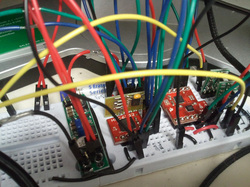
I have a confession to make: I am afraid of being called upon to help with technology. This is after I've answered more than a few questions on Word tools, participated in a MOOC this summer to learn about digital footprints, published my master's portfolio in the required Livebinders format, and launched this professional webpage into cyberspace. I occasionally jump on Twitter--and even occasionally Tweet. For awhile, I was curating my Scoop.it page on digital citizenship and keeping up with my reading blog (which I will get back to, I promise!). I've attended online workshops, collect bookmarks on Delicious, and Facebook on a daily basis to keep up with worldwide friends, professional organizations, blogs, and the weather.
So why is it, with all this tech experience, do I quiver at the thought of being the "go-to" person for technology on my campus? Maybe it's because I've explored enough to realize that what I do know is just a fraction of what's out there and available to teachers and students. I know what works for me, what I can handle (constant Tweeting is not it, that's for sure), and what I consider "user-friendly"--but those are very personal descriptors, and everyone learns and works and organizes and thinks differently. Maybe I quiver because my tech experience is at the user-end of applications; please do not ask me how LANs or hard drives or doc cameras work. Just show me how to push the buttons, connect the hardware, store the data, take the pictures, and teach my students and staff what they need to know in an engaging, educational format. If you find a really cool online app, tell me how it fits into your classroom instruction and makes it better--I'll play with it, too! It's okay if I tear a little bit of hair out in the process; making mistakes is a part of learning. But time is a precious commodity to those of us who have less than 175 days a year to cover more than a year's worth of curriculum, to teach those phonics and reading strategies and math facts and problem solving skills and research paper requirements, while allowing for recess, read-alouds, counseling, lunch, and nose-blowing. It's a tall order for teachers and librarians alike. So please do not ever consider me a tech expert--I'm learning right along with you. I'll do my best to have a quiver-full of tech tools to lay before you, instead of quivering on the edge of the ocean of technology.

The photo I chose to illustrate this post shows how much our communication technology has changed in just the past two decades--and it doesn't even show the latest advances in smartphones. Changes in technology seem to happen every day, which is why I refuse to ever say that I'm an expert in anything technology-related; not only are there new versions and tools popping up constantly, there is seems to be more "bells and whistles" attached to each tool, and I'm fully aware that I don't know at least half of them! With all the hardware, software, and online applications available to schools, educators, and students in this digital age, it is a matter of finding what is easy, cost-efficient, and useful for the learning community.
What I do have going for me is that I am not a technophobe. I am ready, willing, and able to explore the possibilities for educational technology. I am a hands-on learner who needs to "mouse for myself" and play around with hardware and software before I feel comfortable using it with students and staff. I recognize that training takes time, and that is a precious commodity. I also realize this means a change in the role of teacher-librarian, but I am excited by the prospects. I want to have information available for my patrons in the form which suits them best, and for our digital natives, that means not only online access for the most current information, but also tools to create and produce their own materials for learning and assessment. I hope that the next two weeks of this module will provide me with more technological experience and knowledge that I can turn around and use in my classroom and future library position.



 RSS Feed
RSS Feed